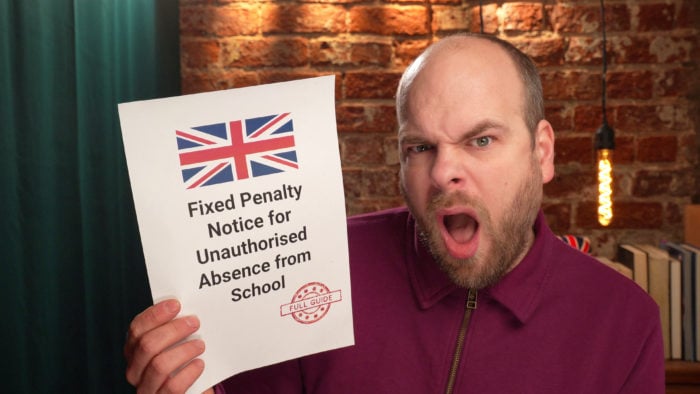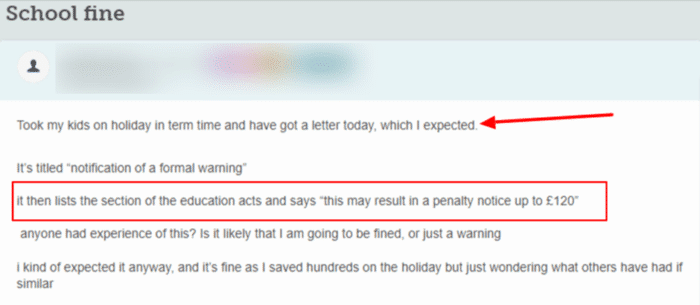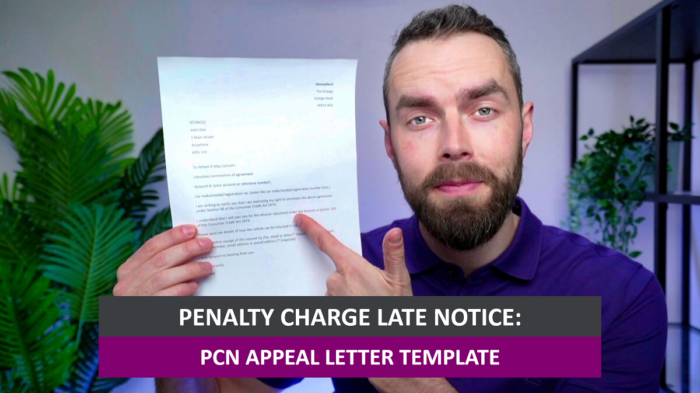Fixed Penalty Notice for Unauthorised Absence from School – Laws

If you’ve just got a Fixed Penalty Notice for your child being absent from school without approval, you may be wondering if you really have to pay it.
Don’t worry; you’re not alone. Each month, over 130,000 people come to our website for help with fines and tickets.
We will explain:
- What a Fixed Penalty Notice means.
- When you might need to pay the fine.
- How you can challenge the fine if you think it’s not fair.
- Times when you might not need to pay.
- What can happen if you choose not to pay the fine.
It’s common to feel confused about receiving a Fixed Penalty Notice. In fact, a group of MPs and Peers say FPNs, which can cost up to £10,000, are hard to understand and might be unfair.1
Don’t worry; we’re here to help you understand what to do next.
Most Appeals Succeed
In some circumstances, you might have a legitimate reason not to pay your fine.
It’s a bit sneaky, but the last time I needed legal advice, I paid £5 for a trial to chat with an online solicitor called JustAnswer.
Not only did I save £50 on solicitor feeds, I also won my case and didn’t have to pay my £271 fine.
Chat below to get started with JustAnswer
*Around 35,000 people dispute their tickets each year with the Traffic Penalty Tribunal, and a striking 64% of those appeals are successful, so it’s well worth a try.
The Law Related to Fixed Penalty Notices for School Absence
The main piece of legislation in play here, is Section 444 of the Education Act.These regulations lay out exactly the reasons a child can be taken out of school.
If you don’t stick to these rules, you might be sent a fixed penalty notice.
I have briefly outlined these below.
- The time off has been agreed upon by the headteacher.
- Your child has been sick. In some cases, you may be asked to provide proof that your child has been sick.
- As part of your religious practices, your child took time off from school on religious holidays.
- Your child should get free transport to take them to school, but the local authority was not able to provide this for some reason.
Any absence that is not covered by these scenarios could result in you being sent a fixed penalty notice.
However, it should be noted that if your child has a good attendance record, it is unlikely that a day or two absence without due cause will result in you being fined.
More likely, the headteacher would call you in for an explanation, and remind you of your responsibilities as a parent to ensure your child attends school.
Successful Appeal Case Study
Situation
| Initial Fine | £100 |
| Additional Fees | £171 |
| Total Fine | £271 |
The Appeal Process
Scott used JustAnswer, online legal service to enhance his appeal. The trial of this cost him just £5.
| Total Fine | £271 |
| Cost of legal advice | £5 |
JustAnswer helped Scott craft the best appeal possible and he was able to win his case.
Scott’s fine was cancelled and he only paid £5 for the legal help.
In partnership with Just Answer.
Why is an FPN Issued?
Most likely, the school will have noticed a pattern of missing school days. You might not even be aware your child was missing school.
However, you are still responsible despite this.
Trigger events for sending a fixed penalty notice related to school attendance can differ between local authorities.
However, have listed some likely reasons to be sent such an FPN below.
- Your child missed at least 5 days from school in the current term, without due cause or authorisation.
- Your child has been late for school more than 10 times in the current term.
- You have failed to reply to questions/enquiries from the school about the attendance of your child.
- You took your child out of school to take them on holiday, but you did not get authorisation from the head teacher.
- Your child is absent from school for some reason, and has come under the eyes of the police during school hours.
How can schools help?
Schools have strategies in place to help children known to skip school, some of which I’ve listed here:
- To maintain communication with a child/parent/carer and to offer support
- Parents are given a key person to contact
- Welcome children when they arrive at school
- Place focus on building relationships with peers and staff
Join thousands of others who got legal help for a £5 trial
Getting the support of a Solicitor can take a huge weight off your mind.
Reviews shown are for JustAnswer.
How can it be Avoided?
Unlike a non-endorsable fixed penalty notice, for a parking offence, an FPN for poor school attendance could ultimately result in court proceedings against you.
The law is very clear on your responsibility to ensure your child attends school, and there is wiggle room built into these rules to cover extenuating circumstances.
Therefore, if you do get an FPN due to poor school attendance, you won’t simply be able to shrug it off and get out of it.
This applies to not just the birth parents of the child, but anyone who is deemed to be giving parental care to a child. Whether married or not.
As I see it, the best advice is to follow the rules and make sure your child attends school regularly.
If you do have to take your child out of school, be honest with the head teacher. They will likely understand your reasons if they are good enough.
Check out why one parent got a warning they might receive an FPN for non-attendance.

Source: Moneysavingexpert
How much is an FPN for non-attendance?
The penalty for non-attendance is £60, but this can increase to £120 when you don’t pay within 21 days but before 28 days.
That said, each authority has its own Code of Conduct guidance for Fixed Penalty Notices.
Can the FPN be Challenged?
First, you need to note that this kind of fixed penalty notice relates to a civil offence, it is not part of criminal proceedings.
At least not yet.
If you fail to send your child to school, you could ultimately end up with a prison sentence of up to three months.
And as we have seen so far, the chance of you being able to get out of paying the FPN in some way is probably quite slim.
Unless you successfully appeal against it which is far from simple to do.
There is no formal process in place to challenge a fixed penalty notice for poor school attendance.
Discretion is given to the headteacher to decide when such action is appropriate.
The headteacher will have already taken steps, such as calling you in to discuss the attendance of your child before an FPN is issued.
However, you may choose not to pay the fixed penalty notice, and then move on to what is known as formal representation. It means that you are willing to take the local authority to court to dispute payment of the FPN.
You would need to pay for a solicitor, and may face additional charges if you lose the case.
» TAKE ACTION NOW: Get legal support from JustAnswer
How to Pay a School Absence FPN
The fixed penalty notice will include instructions on how to make payment. These instructions will differ across local authorities.
Most will likely offer some way to pay online or by phone using a debit or credit card.
If you cannot afford to pay the fixed penalty notice, there is no way to pay it in instalments.
If you really cannot pay, you will have to go through the process of being taken to court to chase payment.
Then prove that you do not have the means to pay to the court.
Hire a Solicitor for less than a coffee.
If you’re thinking about appealing your FPN then getting some professional advice is a good idea.
Getting the support of a Solicitor can make your appeal much more likely to win.
For a £5 trial, Solicitors from JustAnswer can look at your case and help you create an airtight appeal.
Try it below
In partnership with Just Answer.



